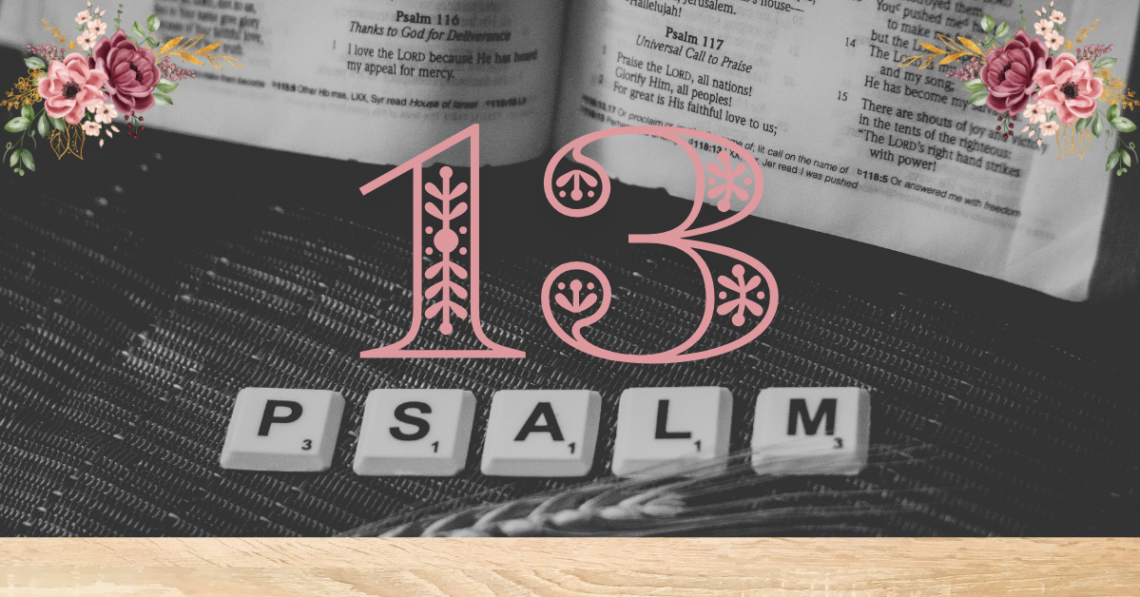How long will it take for God to answer our prayers? When we feel forgotten, Psalm 13 gives us permission to voice our frustrations and doubts before God. But it doesn’t leave us there. It leads us to a place of trust, even when our circumstances haven’t changed yet.
Background of Psalm 13
Psalm 13 is a brief but powerful psalm of David, written during a time of personal distress. It’s a prayer of lament, expressing feelings of abandonment and asking God how long He will allow suffering. Yet, even in the midst of deep anguish, the psalm shifts toward a declaration of faith, reaffirming trust in God’s goodness and salvation.
What Does Psalm 13 Mean?
Psalm 13 is often categorized as a lament psalm, but it also shows a progression from doubt to faith. It can be broken down into four main parts:
- Verses 1–2: David questions God’s apparent absence, asking how long his suffering will last.
- Verse 3: David asks God to look and act, turning his attention to God’s power and ability to deliver.
- Verse 4–5: David reflects on his trust in God’s goodness, even as he waits.
- Verse 6: David ends with a statement of praise, expressing his trust in God’s salvation and love.
Verse Mapping Psalm 13:5
“But I have trusted in your faithful love; my heart will rejoice in your salvation.” (CSB)
1. Word Study
- Faithful love – God’s covenantal, loyal love, often translated as “hesed” in Hebrew.
- Rejoice – To be glad, celebrate with joy.
- Salvation – Deliverance, help, and rescue provided by God.
2. Cross-References
- Psalm 36:7 – The love of God is precious to His people.
- Lamentations 3:22–23 – God’s faithfulness is new every morning.
3. Paraphrase
Even though I’m struggling, I trust in Your unfailing love, and I will rejoice because You will deliver me.
4. Application
Even when circumstances don’t change immediately, we can trust in God’s love and rejoice in His promise of salvation.
How Can We Apply Psalm 13 Today?
Psalm 13 shows us how to process deep emotions and come to a place of trust. Here’s how we can apply it to our lives:
1. Be Honest with God
Like David, it’s okay to ask God the hard questions when we’re hurting. Bring your frustrations and doubts to God without fear of judgment.
2. Remember God’s Faithfulness
In the midst of waiting, recall the times when God has been faithful to you in the past. Trust that He will remain faithful to His promises.
3. Worship While You Wait
David ended his psalm with a declaration of praise. Even when you’re in a season of waiting, choose to worship and trust that God is working on your behalf.
4. Trust in God’s Timing
The timing of God’s answer might not align with our desires, but it’s always perfect. Trust that God is working in ways we can’t yet see.
Reflection Questions
- Have you ever felt abandoned by God? How did you respond?
- How does remembering God’s faithful love change your perspective during tough times?
- In what ways can you rejoice in God’s salvation even while waiting for an answer?
- What is one thing you can do today to trust God more fully?
A Closing Prayer
Lord, like David, I sometimes feel abandoned and frustrated, wondering how long my struggles will last. But I trust in Your faithful love. Help me remember Your past faithfulness and rejoice in Your salvation, even while I wait. May I find peace in Your perfect timing. Amen.
Final Thoughts
Psalm 13 shows us that it’s okay to express our doubts and frustrations before God. He welcomes our honesty, but He also calls us to trust in His love and deliverance. No matter how long the wait, we can rejoice in the salvation He promises.
Share the Hope
If you know someone struggling with doubts or despair, share Psalm 13 with them as a reminder that God hears their cries and will deliver them in His perfect timing.






